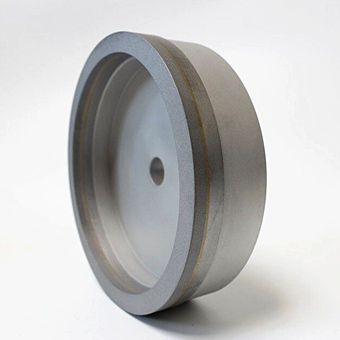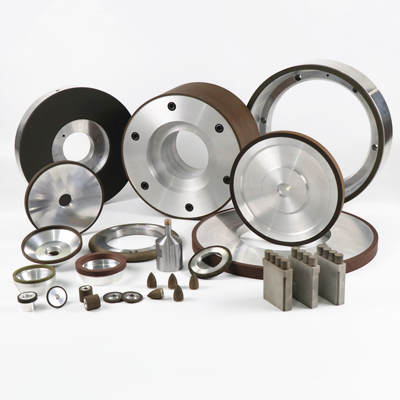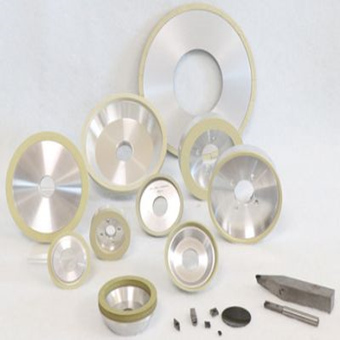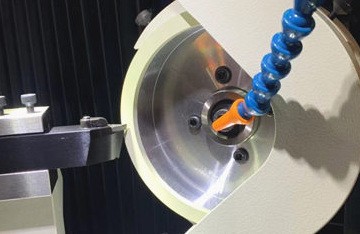Grinding quality of PCD tool with diamond wheel
PCD tool must ensure good cutting edge before machining workpiece. Diamond grinding wheel is the most widely used method. The higher the quality of the cutting edge, the finer the tool mark left at the junction of the geometric reflection region of the workpiece surface, and the higher the surface finish of the workpiece. Because cutting edge collapse or expansion easily cause tool wear or damage, reduce tool life. Edge collapse is a key index of edge quality of diamond tools.
The grinding mechanism of PCD tool is as follows: the grinding grains of diamond grinding wheel constantly impact on PCD material, which causes the brittle breakage (including intra – grain breakage, intergrain breakage and defoliation breakage), sliding wear and scratching of diamond on PCD. Thermochemistry is the oxidation or graphitization of diamond due to the high temperature generated during grinding. There are many factors affecting the cutting edge quality of PCD tool, such as the granularity of diamond powder in PCD composite, the type of diamond grinding wheel, the performance of equipment and the rigidity of fixture.
1. Granularity of diamond powder in PCD composite
Under other conditions being equal, the particle size of PCD diamond powder is positively correlated with cutting edge collapse, that is, the larger the particle size of PCD diamond powder is, the larger the cutting edge collapse is. At the same time, the blade collapse of the mixed particle size is smaller than that of the coarse particle size and closer to that of the medium particle size. This is because the pure coarse particle size is filled with metal binder, while the mixed particle size has both binder and other fine particle size gradations between the coarse particles.
In the process of grinding, the abrasive grains of grinding wheel diamond constantly impact on the cutting edge of PCD tool, and the plastic of PCD tool is poor, so the micro edge collapse will occur at the cutting edge. From the microscopic analysis, the diamond particles in PCD tool appear brittle breakage and collapse during extrusion and friction, and the collapse size of the brittle breakage is positively correlated with the particle size of the diamond powder. The larger the particle size is, the larger the blade collapse is. In addition, because of the fine round diamond abrasive hardness is lower than the medium and coarse particle of PCD diamond particles, abrasive score function is weak, but the fine wheel abrasive wear easily and congestion, high grinding temperature, brush and thermal chemistry dominant sliding, thus reduce or eliminate the brittle fracture appear larger crack, so the final formation of edge collapse is less than the particle size.
2. Type of diamond grinding wheel
Cutting edge collapse sequence: metal bond grinding wheel > vitrified bond grinding wheel > resin bond grinding wheel. When the grinding wheel particle size is greater than W10, the blade collapse value is sensitive to the grinding wheel particle size and increases with the grinding wheel particle size. When the grinding wheel particle size is less than W10, the edge collapse value is not sensitive to the grinding wheel particle size.
Metal bond diamond grinding wheel grinding grain broken occurred in the process of grinding to maintain state, sharp grinding, so as to realize the resin bond diamond grinding wheel surface will occur because of the heat deformation, appropriate USES low grinding speed, ceramic binder is composed of a variety of materials with pressure, grinding process of bond and diamond grits collective falls off easily, The PCD tool surface left pits.


3. Speed of the device
In the grinding process of PCD tool, high or low speed can not guarantee the quality of the cutting edge, and a moderate speed is needed to obtain the minimum cutting edge collapse. The rigidity accuracy of the grinding machine affects the range of the optimal speed.
4. Grinding pressure
Generally, the maximum value of edge collapse increases with the increase of grinding pressure. With the increase of grinding pressure, the extrusion effect of a single abrasive particle on PCD will be enhanced, resulting in cleavage and fatigue crushing of PCD more easily. If the pressure is too small, the grinding efficiency is low; if the pressure is too large, the edge is prone to collapse. It is necessary to determine the appropriate grinding pressure according to the condition of the equipment.


